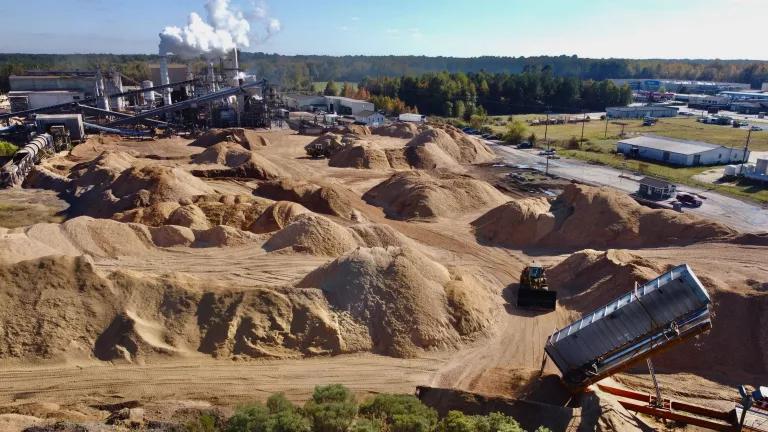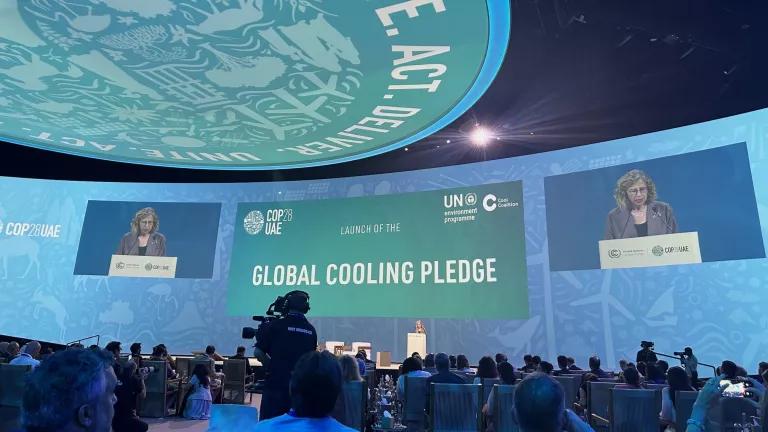Women Climate Leaders Are Transforming India

Representatives from around the world have gathered in San Francisco this week for the Global Climate Action Summit. A number of today’s summit events focus on the critical role of women in achieving our collective climate ambitions. That theme will also feature in tomorrow’s High-Level Forum on India Climate Actions, which is being co-hosted by NRDC. The forum will welcome many influential women participants who are at the forefront of climate actions related to health, energy access and job creation in India.
Addressing Air Pollution
Across India, air quality is a pressing concern because of its adverse health impacts. A Lancet Commission study found that each year 1.09 million deaths in India are attributable to ambient air pollution. All 280 Indian cities monitored by the World Health Organization have been found to exceed safe levels of coarse particle pollution. The sources of India’s unhealthy air include dust, construction, power plants, waste and agricultural burning, cooking, and combustion, including from vehicles. To address this public health issue, Prime Minister Narendra Modi has pledged to reduce air pollution by 50 percent in 100 cities.
Air Quality and Heat Resilience in Ahmedabad
The city of Ahmedabad was the first in the country to adopt a comprehensive Air Information & Response Plan, which includes ten local monitors that display health advisories. When air quality is at dangerous levels, vulnerable groups, like children, the elderly and those with lung problems, can take precautions. Mayor Biljalben Patel will be discussing new research on urban air pollution at the forum, and describing her plans for bolstering the city’s resilience to air quality and extreme heat. Ahmedabad’s Heat Action Plan was India’s first and has since spurred many similar programs in other cities and states.
Spreading Sustainability in Pune
In addition to air quality, Pune Mayor Mukta Tilak is pursuing a broad agenda of sustainability in her city, including improving the transportation and waste management systems, and addressing the issue of affordable housing. Today, Mayor Tilak is being honored for her work to improve the energy efficiency of room air conditioners during the summit’s Super Pollutant Day. She will also be Talking Trash on Thursday with San Francisco Mayor London Breed and signatories to the C40 Advancing Towards Zero Waste Declaration. Globally, improved waste management and reduced waste generation could reduce greenhouse gas emissions by up to 20 percent. In Pune, Mayor Tilak’s focus is on waste segregation and recovery.
Pioneering Electric Vehicle Infrastructure in Nagpur
To reduce air pollution from petroleum-powered vehicles, Nagpur Mayor Nanda Jichkar is creating a comprehensive e-mobility plan, which includes electric vehicle charging infrastructure, ride-sharing programs, discounts on electric buses, and tax incentives for eclectic and hybrid vehicles. During the forum, we will hear more from Mayor Jichkar on her plans for environmental protection, climate change mitigation and building climate resilience in Nagpur.
Scaling Regional Heat Action Plans in Maharashtra State
The state of Maharashtra is home to more than 100 million residents, including those in the metropolitan areas of Mumbai, Nagpur and Pune. Principle Secretary for Financial Reforms Sujatha Saunik has initiated state and regional programs that help local leaders prepare for extreme heat events. For example, under her leadership, Nagpur and four neighboring cities developed and implemented the country’s first Regional Heat Action Plan. Under the plan, children and the elderly have been identified as vulnerable populations in particular need of heat alerts when temperatures soar.
Civil Society Leading on Sustainable Development
Climate leadership by women in India also extends into areas of sustainable development, such as increasing energy access and creating green jobs. Nationwide, more than 200 million people lack of access to reliable electricity, and many rural communities would be best served by non-grid based distributed renewable energy solutions, such as rooftop solar. NRDC estimates that solar and wind infrastructure projects have the potential to employ 300,000 workers over the next five years. Another 45,000 could be employed in the solar manufacturing sector.
Access to renewable energy sources and energy efficiency deliver better health, greater economic independence, and long-term climate benefits. NRDC and the Self Employed Women’s Association (SEWA)’s pilot projects with saltpan farmers provide a powerful example of this fact. In the Gujarat desert, 43,000 saltpan farmers, or agarias, produce 70 percent of India’s salt. The agarias have traditionally relied on inefficient diesel-powered technology to pump underground brine to the surface for drying on salt flats. The diesel pumps require saltpan farmers to spend about 40 percent of their revenue on fuel, and leave them vulnerable to petroleum market fluctuations.
During the forum, SEWA Regional President Heena Dave and saltpan farmer Gauriben will describe how NRDC and SEWA replaced diesel pumps with solar powered pumps in pilot project areas. Drawing upon the sun as a renewable resource resulted in higher yields, a 161 percent increase in cost savings, and more available energy. These outcomes have enabled agarias families like Gauriben’s the ability to pursue educational and other economic development activities. We will hear first hand what this has meant to Gauriben and her family, and how SEWA and NRDC plan to expand the program.
The leadership of women in government, businesses, academia and civil society organizations has been integral to India’s progress on climate resilience, energy efficiency and renewable energy. Those participating in tomorrow’s forum provide inspiring examples of the many other women who are also catalyzing impactful climate action in India and beyond.



